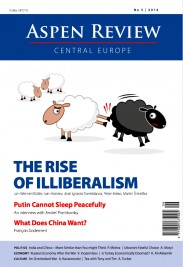In his seminal work titled The End of History, Francis Fukuyama interpreted the post-Cold War events as the end of history, which he described as the end point of mankind's ideological evolution and the universalization of Western liberal democracy as the final form of human government.
In Europe 25 years later, we are witnessing proliferation of political ideas that challenge the hegemonic position of liberal democracy in the regional political landscape. Among the most pronounced examples are the political projects and aspirations of Victor Orban and Vladimir Putin. But is there an "Orbanism" and "Putinism“?
Jan-Werner Müller, professor of politics at Princeton University, explores in his article for the Aspen Review whether or not their political leaderships qualify as political ideologies. He questions whether the West understands the logic behind Putin and Orban or if it is being outsmarted.
You can browse all content of the Aspen Review quarterly on our website. To read the full article written by Jan-Werner Müller, please click here.

